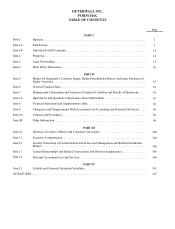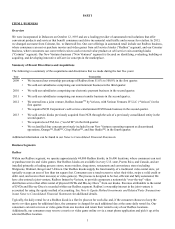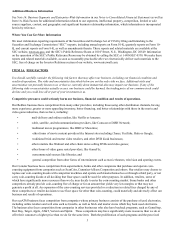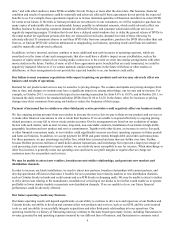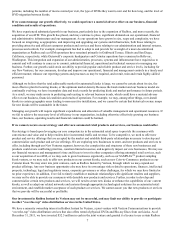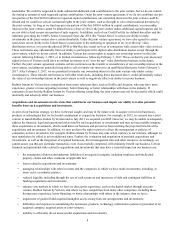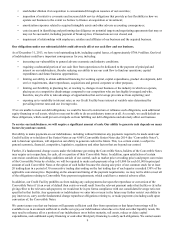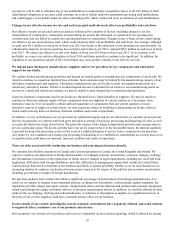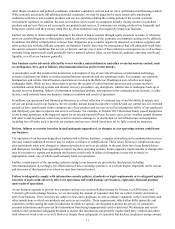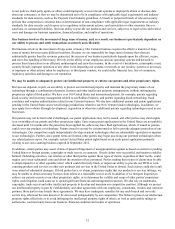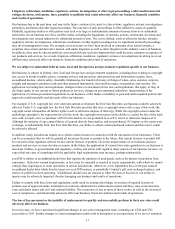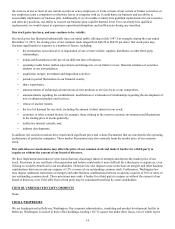Redbox 2013 Annual Report Download - page 15
Download and view the complete annual report
Please find page 15 of the 2013 Redbox annual report below. You can navigate through the pages in the report by either clicking on the pages listed below, or by using the keyword search tool below to find specific information within the annual report.6
date,” and with other studios to make DVDs available for rent 28 days or more after the street date. Our business, financial
condition and results of operations could be materially and adversely affected if these agreements do not provide the expected
benefits to us. For example, these agreements require us to license minimum quantities of theatrical and direct-to-video DVDs
for rental at our kiosks. If the titles or format provided are not attractive to our consumers, we will be required to purchase too
many copies of undesirable titles or an undesirable format, possibly in substantial amounts, which could adversely affect our
Redbox business by decreasing consumer demand for offered DVD titles and consumer satisfaction with our services or
negatively impacting margins. If studios that do not have a delayed rental window elect to delay the general release of DVDs to
the rental market for significant periods after they are released for retail sales, demand for rental of these titles may be
adversely affected. If consumers choose to rent these DVD titles from our competitors, purchase the DVD titles rather than rent
from us, or find our DVD title selection unbalanced or unappealing, our business, operating results and financial condition
could be materially and adversely affected.
In addition, we have incurred, and may continue to incur, additional non-cash increases to operating expenses, which are
amortized over the terms of any such arrangements, that also could have a dilutive impact on our stockholders, such as the
issuance of equity under certain of our existing studio contracts or to the extent we enter into similar arrangements with other
movie studios in the future. Further, if some or all of these agreements prove beneficial but are early terminated, we could be
negatively impacted. Moreover, if we cannot maintain similar arrangements in the future with these or other studios or
distributors, or these arrangements do not provide the expected benefits to us, our business could suffer.
Our failure to meet consumer expectations with respect to pricing our products and services may adversely affect our
business and results of operations.
Demand for our products and services may be sensitive to pricing changes. We evaluate and update our pricing strategies from
time to time, and changes we institute may have a significant impact on, among other things, our revenue and net income. For
example, in October 2013, we increased the typical coin-counting transaction fee from 9.8% to 10.9%, and in October 2011, we
increased the daily rental fee for standard definition DVDs from $1.00 to $1.20. In the future, other fee increases or pricing
changes may deter consumers from using our kiosks or reduce the frequency of their usage.
Payment of increased fees to retailers or other third party service providers could negatively affect our business results.
We face ongoing pricing pressure from our retailers to increase the service fees we pay to them on our products and services or
to make other financial concessions to win or retain their business. If we are unable to respond effectively to ongoing pricing-
related pressures, we may fail to win or retain certain accounts. Our fee arrangements are based on our evaluation of unique
factors with each retailer, such as total revenue, long-term, non-cancelable contracts, installation of our kiosks in high-traffic,
geographic locations and new product and service commitments. Together with other factors, an increase in service fees paid,
or other financial concessions made, to our retailers could significantly increase our direct operating expenses in future periods
and harm our business. In addition, we accept payment for DVD and game rentals through debit and credit card transactions.
For these payments, we pay interchange and other fees, which have increased and may increase further over time. Further,
because Redbox processes millions of small dollar amount transactions, and interchange fees represent a larger percentage of
card processing costs compared to a typical retailer, we are relatively more susceptible to any fee increase. When interchange or
other fees increase, it generally raises our operating costs and lowers our profit margins or requires that we charge our
customers more for our products and services.
We may be unable to attract new retailers, broaden current retailer relationships, and penetrate new markets and
distribution channels.
In order to increase our kiosk installations, we need to attract new partners, broaden relationships with current partners, and
develop operational efficiencies that make it feasible for us to penetrate lower density markets or new distribution channels,
such as Coinstar kiosks in banks and credit unions and ecoATM kiosks in shopping malls. We may be unable to attract retailers
or drive down costs relating to the manufacture, installation or servicing of our kiosks to levels that would enable us to operate
profitably in lower density markets or penetrate new distribution channels. If we are unable to do so, our future financial
performance could be adversely affected.
Our future operating results may fluctuate.
Our future operating results will depend significantly on our ability to continue to drive new and repeat use of our Redbox and
Coinstar kiosks, our ability to develop and commercialize new products and services, such as ecoATM, and the costs incurred
to do so, and our ability to successfully integrate acquisitions and other third-party relationships into our operations. Our
operating results have a history of fluctuating and may continue to fluctuate based upon many factors, including fluctuations in
revenue generated by and operating expenses incurred by our different lines of business, and fluctuations in consumer rental





